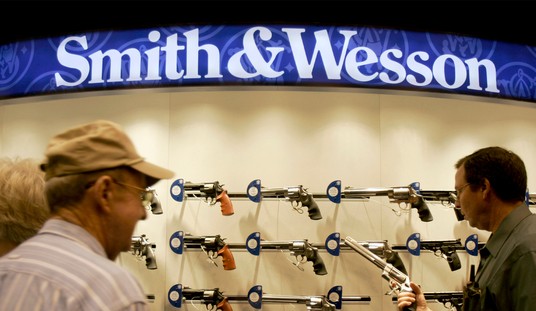
You can’t blame the Huffington Post for not knowing anything about guns, can you? I mean, they’re a left-leaning political site with pretensions of being part of the mainstream media. They don’t know anything about firearms and gun owners, and worse is that they don’t seem to realize how little they know about any of it.
That’s on display in an article where they tout yet another so-called smart gun as some breakthrough.
Sometime in the next year, Philadelphia-based startup LodeStar Firearms says it will release the first commercially viable smart gun, a 9 mm semiautomatic handgun with a user-recognition lock designed to allow only authenticated users to fire it.
This sort of technology hasn’t caught on in the U.S., so it’s something of a gamble for LodeStar, which is raising $3 million in seed funding to finalize a prototype. The company is banking on being able to disrupt the firearms industry by capitalizing on an uncertain demand for gun safety features. If such advances prove popular, LodeStar says, it could lead to an industrywide evolution that would ultimately save thousands of lives each year.
LodeStar is still ironing out the specifications of its pistol; regardless of how it turns out, it won’t be the first or only smart gun on the U.S. market. Firearms manufacturers have been tinkering with personalized locking technology for decades, hoping to sell consumers on handguns that are resistant to misuse by children, thieves or assailants.
But smart guns have largely failed to break through, in part because of opposition from people who claim the technology will lead to bans on traditional firearms, with only more expensive and less reliable options allowed. Pro-gun groups have even boycotted companies that have pursued gun safety initiatives.
…
The iP1 showed some promise but was widely criticized for its high cost, futuristic appearance and security vulnerabilities, and gun rights advocates said it would lead to a broad smart gun mandate. Very few gun stores offer the iP1, with some perhaps deterred by death threats against some early sellers.
LodeStar appears to have learned from the hurdles faced by Armatix and has started by focusing on price. This week LodeStar released the results of a study of gun-owning households that sought to identify how much they would be willing to pay for a reliable childproof smart gun. The survey found that the most respondents said they would shell out $795 ― about $300 more than a comparable conventional handgun. A price of $995 would maximize profit for LodeStar but result in fewer units sold, according to the study.
The company will aim for the $795 price tag in hopes of getting its smart guns into as many hands as possible, said Glaser.
Except price is only the tip of the iceberg.
You see, there are a lot of reasons many of us oppose so-called smart guns, and there’s a very good reason why most gun stores won’t sell the iP1 as well.
First, let’s talk about why many of us oppose smart guns on the surface.
For one thing, they’re unreliable. Current firearm technology is well-tested. For over a century, we’ve had semiautomatic handguns. It’s tried and true. Smart guns, however, jam. That’s because it’s a new technology for one thing, but that’s not the only reason. Another reason is that the technology adds exponentially more failure points into the firing of the gun.
Take a gun like the iP1 which requires the user to wear a watch. What happens if the watch’s battery dies? What happens if the circuitry that sends out the RFID signal stops transmitting? What if the chip inside the gun that receives the signal stops receiving? What if the power source inside the gun is dead?
Now, let’s add in situational issues, like the sound of breaking glass while you’re taking a shower and aren’t wearing the watch?
In and of itself, this is a concern of the marketplace itself. Guns like this won’t sell because gun owners aren’t interested in the risk associated with trusting their lives to untried technology or guns with so many potential points of failure.
But it’s not just a market issue.
New Jersey passed a law in 2002 that basically bans all other handguns the moment smart guns become viable. It’s the real reason most of the big boys aren’t pursuing the technology. The moment they develop it, the industry as a whole loses the state of New Jersey, and no one wants to see that. It also doesn’t help that as soon as it becomes viable, we know that other states like New York, Massachusetts, and California will pass similar laws.
So it’s not just a case of not wanting to have smart guns, anti-gun lawmakers have made it imperative that we actively oppose this technology. There’s a reason why we fight these companies so damn hard.
And that doesn’t even take into account that the iP1 is a .22 handgun. Not exactly a serious personal defense caliber by any stretch of the imagination.
Now, let’s talk about gun stores for a moment. Do you want to know why many won’t stock guns like this? The answer is simple. Gun stores are run by gun people. For all of the above reasons, gun store owners–to say nothing of countless other reasons–aren’t going to stock the damn things.
When a gun store decides to stock it, though, it’s a betrayal. That store has signaled not that they’re concerned with safety, but that they support gun control. Like it or not, New Jersey made it that way in 2002. Anyone who seems to want to see these guns do well is someone who essentially wants to see only these guns do well.
Don’t like it? Well, again, tell that to New Jersey.
Repeal that law and prevent similar laws from being passed, and the rise and fall of smart guns will become a market issue. In the free market, if they’re cost-effective and reliable, then they’ll eventually take over the market much like how polymer frame handguns have. If they’re not reliable and cost-effective, the market will crush them, as it should.
But again, it’s not that simple. Smart guns are being pushed due to politics, not demand, and they’re getting political help to make them the only game in town.
The fact that Huffington Post doesn’t say that means they’re either ignorant or lying. With them, it could go either way.








Join the conversation as a VIP Member